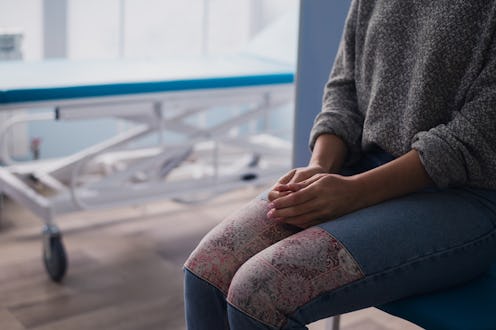Life
What Having A Heart Attack Young Is Like, According To 3 Women Who’ve Been There

Heart problems don't just affect older men; they can happen to young people, too. In fact, a 2018 study found that heart attacks are becoming more common in young people, specifically age 35 to 54. Women who've survived heart attacks young tell Bustle that they faced problems getting the correct diagnosis in time — and recovery is an ongoing process.
While the average age for a first heart attack in women is 72, there's a particular kind of heart attack called spontaneous coronary artery dissection, or SCAD, that's disproportionately common in young women. In a typical heart attack, plaque builds up in the arteries and blocks the flow of blood; with SCAD, a piece of the blood vessel tears off, allowing blood to clot around it. Mayo Clinic says that people with SCAD may not have typical risk factors for heart disease, making awareness of this kind of attack all the more important.
Shawn Sherlock, now 47, believed her heart was healthy; she was former captain of the NBA's Miami Heat dance team and had excellent blood pressure and cholesterol. Then, in 2017, she experienced symptoms of a heart attack, which was later found to be SCAD. "I first felt my jaw start to ache and then an excruciating pain shot down my left arm. I immediately thought, no way — this could not be a heart attack," she says. She was rushed to hospital and had two stents put in her heart, but had another episode in hospital and remained there for two weeks.
For other people, stress on the heart during pregnancy can cause cardiovascular problems. That was the case for Jenny Petz, a volunteer for Go Red For Women at the American Heart Association; just eight days before her heart attack, at the age of 32, she'd given birth to her first child. "My throat started closing, and I had a weird tingling sensation that traveled down my shoulders and into my left arm, which went numb," she tells Bustle. "When I stood up, I started to get lightheaded and that’s when I hit the dust."
Melissa Olaso had unexplained health issues throughout her fourth pregnancy when she was 34, and then experienced heart and organ failure during delivery. "I was immediately placed on a ventilator to help me breathe, transferred to the CCU, and placed on heart-supporting medications, but my condition did not improve," she tells Bustle. Eventually she had to have a heart pump temporarily inserted to help her survive.
Olaso believes, in hindsight, that the problems she had throughout the pregnancy were due to her failing heart — but nobody noticed. "Going into my pregnancy, I was a healthy woman with no medical issues," she says. She experienced fatigue, shortness of breath, and difficulty sleeping while laying flat all the way through her pregnancy, but her OB/GYN said they were normal pregnancy issues. Afterwards, her cardiologist said those could have been signs of heart issues.
Each woman says that recovery has been difficult. "My SCAD and heart attack changed my life forever," Sherlock tells Bustle. She spent months in doctor-ordered cardio rehab, and eventually transitioned back to a regular gym. "If J.Lo can do it at 50 in that Super Bowl, I can do it at 47!" She also revamped her nutrition, has annual stress tests, and began seeing a therapist. For Olaso, basic movement took a long time to relearn, and she was on daily heart and kidney medication for a year; her heart and organ function returned to normal after 12 months.
Petz says that she had a lot of emotional healing to do, too. "It was very difficult getting a grasp on what had happened for about two years," Petz says. "I was fearful of every time I felt something I was going to have a reoccurrence. I was having severe PTSD and panic attacks that were affecting my life and small children." Thanks to yoga and medication, she began the journey to mental recovery, but it was a difficult one. "The mental aspect is the hardest. You aren't what you used to be, but you are alive," Sherlock says.
Each woman says there needs to be more awareness of what it's like having a heart attack when you're young, particularly out of the blue. Youth and gender are two reasons people can discount their heart attack symptoms, leading to a diagnosis that potentially comes too late. The typical sign of a heart attack is chest pain that radiates down the left arm, but while these symptoms can happen in women, other signs are more common.
“Women can present differently than men and with more subtle and atypical symptoms, so heightened awareness is very important," Dr. Tarak Rambhatla M.D., a cardiologist at the Miami Cardiac & Vascular Institute, tells Bustle. In women, heart attack symptoms can include nausea, heartburn, shortness of breath, sweating, lightheadedness, fatigue, and discomfort in your jaw, neck, abdomen or shoulders.
Knowing these signs could save lives. "We need to spread the word on this, so no one has to go through what I did," Sherlock says.
Studies cited:
Arora, S., Stouffer, G. A., Kucharska-Newton, A. M., Qamar, A., Vaduganathan, M., Pandey, A., … Caughey, M. C. (2019). Twenty Year Trends and Sex Differences in Young Adults Hospitalized With Acute Myocardial Infarction. Circulation, 139(8), 1047–1056. doi: 10.1161/circulationaha.118.037137
Expert:
This article was originally published on